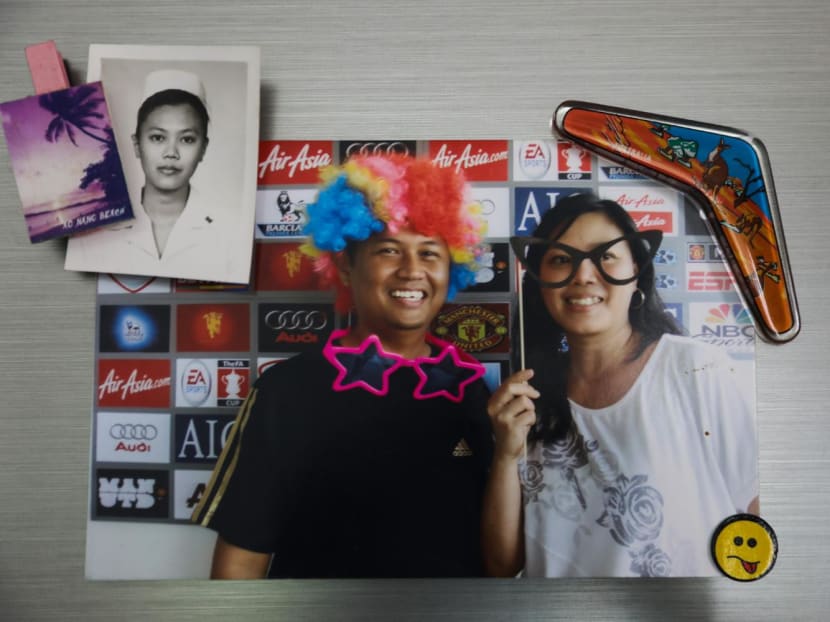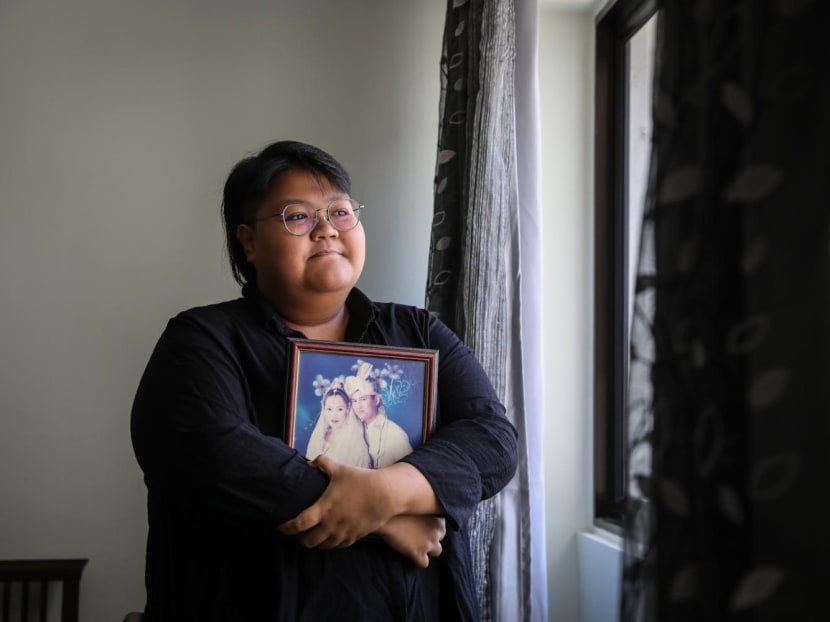Gen Z Speaks: Being a daughter to a sick parent is hard, but I’d do it all over again
Over the past 20 years of my life, I have held many jobs.
Over the past 20 years of my life, I have held many jobs.
I’ve loaded shipments, replenished groceries, and done stints in the media industry as a freelancer. But being a daughter and a caregiver to my sick mother was the first job I had, and it was the hardest.
I am the only girl among my three brothers, so my natural nickname in my family was just "Girl".
As the third child, all the middle-child stereotypes of being rebellious were somehow not applicable to me, as I always acted as the peacemaker in the family.
I was 16 when Mama was diagnosed with stage four colorectal cancer in June 2019.
Being her only daughter, she confided in me about everything. I was one of her best friends.
Working in so many odd jobs during my polytechnic years, I developed a sense of anxiety whenever I had nothing to do for a day and slowly became a workaholic.
I would have production shoots or editing to do after school, and my weekends were spent holed up in a warehouse and then again crammed in my space to edit out videos and articles.
I worked so much that I got burnt out and fell ill a lot. Mama was always so supportive, but still so worried about me. She always loved me no matter what, but I wanted her to be proud of me.
Mama passed away from cancer in March 2023, a week before her 52nd birthday.
Before she passed, Mama would say that she was going to see Nenek (Malay for grandmother) again. My late grandmother left us six years ago.
Even till the end, she loved her Mak (Malay for mother) and wanted to spend more time with her.
It is the same for me, even though I spent the most time I had in her final years being her caregiver, and staying by her side.
It was the hardest job I ever had to do. However, I would do it all over again just to be with Mama.
PART-TIME CAREGIVER AT 16
Growing up, my mother was always like a superhero to us kids. But her bout with cancer let me see her vulnerable sides.
A couple of days before my Mathematics O-Level examination in 2019, I brought her to her first chemotherapy session, after she had surgery a few months prior to remove her growing tumour.
My brothers were especially confident that she was going to be fine. But I knew how human she really was, and I knew that she was feeling anxious.
It was her first chemo and she panicked. She begged me to call the nurses because she couldn’t breathe. She never knew how to deal with her panic attacks, and I struggled trying to calm her down.
She clenched her fists to her chest, screaming, but nothing came out of her mouth. Mama was not a superhero, she was merely a human being who needed care and love. That was the first time I saw her give up.
Alas, the first chemotherapy session was unsuccessful, and she never got to finish the cycle. It was too intense for her to deal with, and for the first time ever, she couldn’t do it. She never wanted to do it again.
She recovered post-chemo at home, in so much pain that she would stay in bed all day.
I would incessantly peek through her ajar door to see her chest move, just so I knew she was alive and breathing before I left for my O-Level examinations.
It hurt me so much to see her in so much pain and have nothing to do to help her. Yet, even until her last breath, her only worry was the family she was leaving behind.
Even when she was unwell and weak, she always made sure she did something, such as cleaning the house, like the neat freak that she was. She even told us to repair the plumbing in the kitchen when she was in her final days.
In 2021, we finally convinced her to go back to chemotherapy to try and fight the cancer when it spread to her liver.
Despite these hospital visits, nothing worked. I saw her lose hope and drift away from me.
I was still a full-time student then, with after-school activities and engagements.
Needless to say, I felt extremely guilty for not being there for her as much as I wanted to be. I accompanied her to as many hospital visits as I could, and I spent many lunches in the hospital.
It still wasn’t enough.
BECOMING A FULL-TIME CAREGIVER
She fought the best that she could because she still had so much to live for.
Until we found out in December 2022 that no treatments were working anymore because her organs were failing by the day — the cancer had spread to her lungs and her heart.
I was in my last semester as a year three mass communications student at Republic Polytechnic when I got the news. I always felt like I had the time to be with her, that I would have at least a few more years.
Struggling with my last semester, I was back and forth between school and the hospital. Just like I did, the past three years of my life. I spent so much time in the hospital that I knew which floors had the better bathrooms.
However, Mama requested that she spend her last days at home, which meant that she needed someone to be at home with her.
I stepped up to be there for her, though I wasn’t the only one. Thankfully, a nurse from the Methodist Welfare Services would come weekly to check on Mama’s condition too.
The hospital also provided her with numerous bags of painkillers, including morphine and fentanyl, to help her manage her suffering.
There were a lot of different medications that had to be given at the times the patient needed them, and I had to learn them on the job.
To this end, the help I got from the hospice nurses was invaluable.
Initially, all she required were fentanyl patches that I had to switch out every three days. Over time, she gradually started to experience difficulty performing simple daily tasks like standing up or taking a shower.
Jaundice, caused by an increase in bilirubin in her blood as a result of her liver failing, caused her skin to turn yellower and yellower.
The nurse taught me how to administer various medications to relieve her pain. These episodes came frequently in the middle of the night, when Mama would scream in pain or when she was simply unable to breathe.
STRESSES OF THE JOB
Being a caregiver was challenging enough, but it was especially difficult to watch as Mama deteriorated into a hollow body after each day. I couldn’t recognise my Mama anymore.
Fortunately, I had a lot of support from our family. Mama was well-loved, and everyone always said that there was no one she loved more than her children. She would side with us even if we were in the wrong. Mama had our backs, always.
Mama’s siblings, my uncles and aunts, came over very often to help me during the day. They wanted to spend as much time as they could with Mama, too. My two older brothers and my father also took turns helping me take care of her while I rested.
The nurses and doctors who came to visit Mama always had one thing to tell me: to take a break when I get tired and to share responsibilities with my family.
My father, too, was instrumental in this family-wide effort.

He was the one who mostly took over me when I got fatigued, and he wanted me to rest whenever I could. He was also the only one to stay at the hospital every single day by her side when she was last hospitalized.
Even with so much help, I felt so guilty for saying I was exhausted.
It wasn’t just because of interrupted sleep but also because it was mentally draining. I was at her beck and call, night and day. I was bound to reach the point of burnout.
I never wanted Mama to feel like a burden. One thing she hated was depending on others. She raised us to be independent on our two feet.
On the other hand, I was so tired. I worked so many jobs — as many as three part-time jobs during my second year in polytechnic. But taking care of her was much more painful and tiring than I thought.
Before I could reach burnout, I did what I never thought I would do.
I asked for help. It wasn’t easy because Mama raised me to do things by myself. I requested that another caregiver take over at night while I got at least a few hours of sleep.
However, she passed the following night.
LAST MOMENTS
I saw my mother take her last breath as I held onto her hand tightly. I told her to let go, that we’d be okay. But at her last breath, I desperately hoped she took another. I couldn’t imagine my life without her.
Many of my relatives and friends say the typical sentences you would hear, like how sorry they are or how she’s in a better place.
Only one sentence comforted me the most: “She isn’t in pain anymore.”
The one thing I wanted to do was ease the pain she was in, but this one sentence was the truth. It comforted me to know she wouldn’t struggle anymore.
But I wished we had another adventure together. I wished for more time. She’s gone now, and I have to accept that.
Our emotions and experiences will never disappear, but they can turn into something different.
Grief is difficult and never goes away, but that does not mean that I should give up. I knew my limits, and I asked for help. Now, though I feel grief, I must learn how to forge ahead.
We’re only humans; we feel, we love, and we fall. The grief that I feel now changes me, but it could also teach me to love harder. Her memory will live through my brothers and me forever.
I know that I am not alone. I wasn’t the only one to lose her. She made me who I am today, and that is why she will always be with me because I am a part of her.
She lived the life she wanted, and now it’s my turn. Mama always said: “Keep moving forward”, and so I will.
ABOUT THE AUTHOR:
Qistina Hatta, 20, is a Republic Polytechnic graduate and is currently waiting to begin her university education.










